Tony Bennett: the Great American Songbook crooner
The US singer successfully bridged the worlds of pop music and jazz on a global scale for more than 60 years
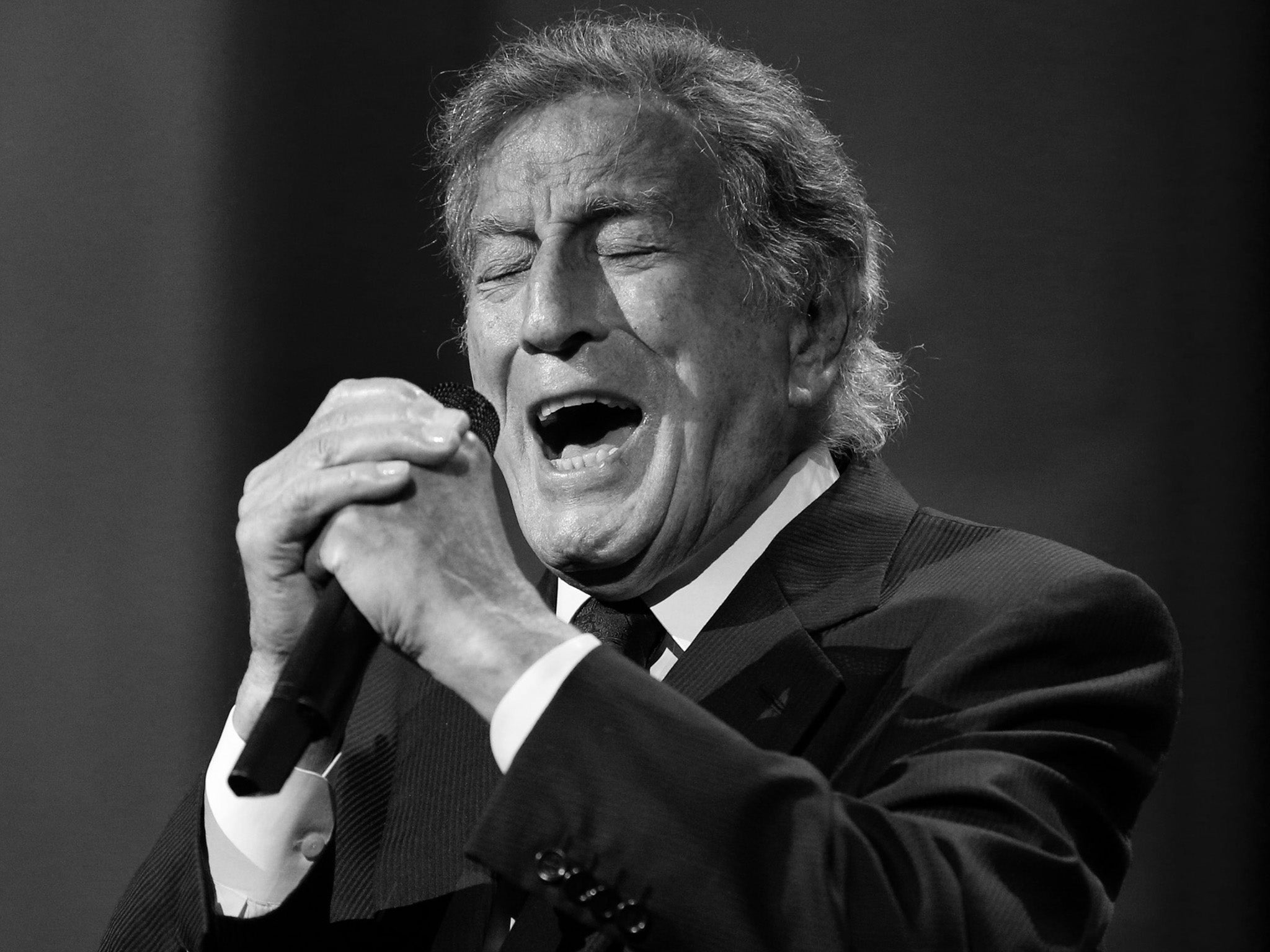
When Tony Bennett topped the bill at Glastonbury festival in 1998, his appearance marked a redemption that 20 years previously would have seemed unimaginable.
Although Bennett later was acknowledged as the only artist to successfully bridge the worlds of pop music and jazz on an international scale for more than 60 years, by the late 1970s he had fallen utterly from grace; he was without a record contract, and deemed quintessentially unfashionable by hip young record buyers. And he was also mired in serious drug problems.
By the 21st century, however, Bennett was working with acts considered the personification of iconoclasm, such as Amy Winehouse and Lady Gaga. In 2014, at the age of 88, he enjoyed 18 weeks in the number 1 US album slot with Cheek to Cheek, a Grammy Award-winning set of duets with Gaga. It replicated the success of his Duets II album, three years previously, on which he worked not only with Gaga and Winehouse, but also with Aretha Franklin, Natalie Cole and Michael Buble, among many others.
Duets II debuted at number 1, making him the oldest living artist to enter the Billboard album charts in the top slot. The record won the 2011 Grammy Award for Best Traditional Pop Vocal Album; for his duet with the by-then-deceased Amy Winehouse on Body and Soul, Bennett also won a Grammy that year for Best Pop Duo.
Body and Soul was Bennett’s first entry on the Billboard Hot 100 singles chart in nearly 45 years. And the Grammy which he earned three years later with Lady Gaga marked his 18th such honour, including a 2001 Lifetime Achievement Award.
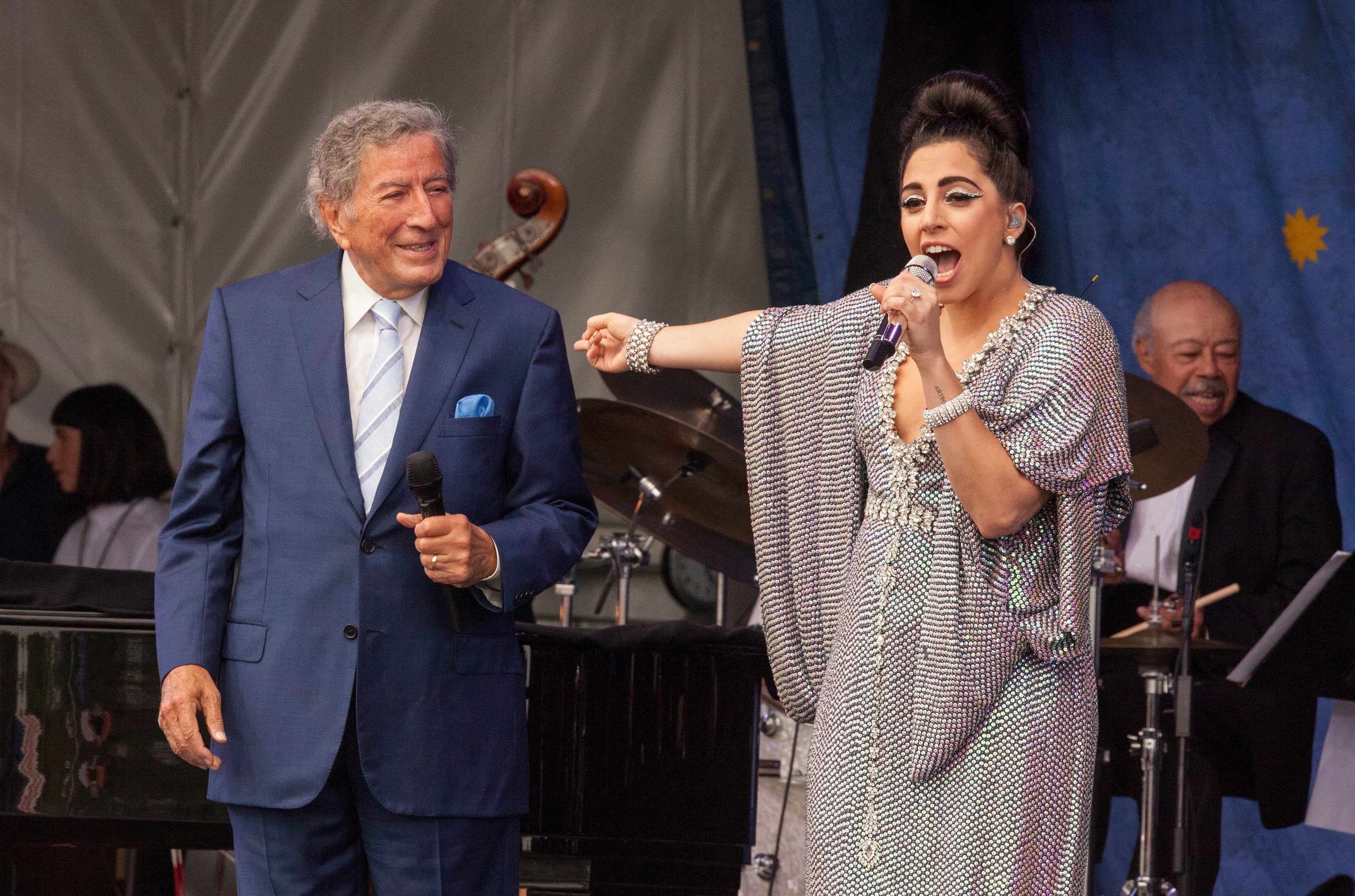
Bennett was a lifelong Democrat, the consequence of growing up in Astoria, Queens, in the poverty of the Great Depression. His father, a grocer from southern Italy, had long been ill; unable to work, but with a love of art and literature that he instilled in his son, he died when the future singer was 10. From that young age, needing to bring in money for his family, Bennett worked in restaurants, waiting tables and from the age of 13 singing to customers.
His liberal outlook on life was undiminished: in 1945, while serving in Germany as a GI, he was demoted for eating dinner each evening with a black friend from high school. (A passionate advocate of the American civil rights movement, 20 years later he took part in the Selma to Montgomery marches.)
Although Bennett’s time as a Second World War infantryman was less than three months, he was involved in tough house-to-house fighting in Germany, and was part of the liberation of a concentration camp; the experience made him a pacifist, later writing, “It was a nightmare that never ended.”
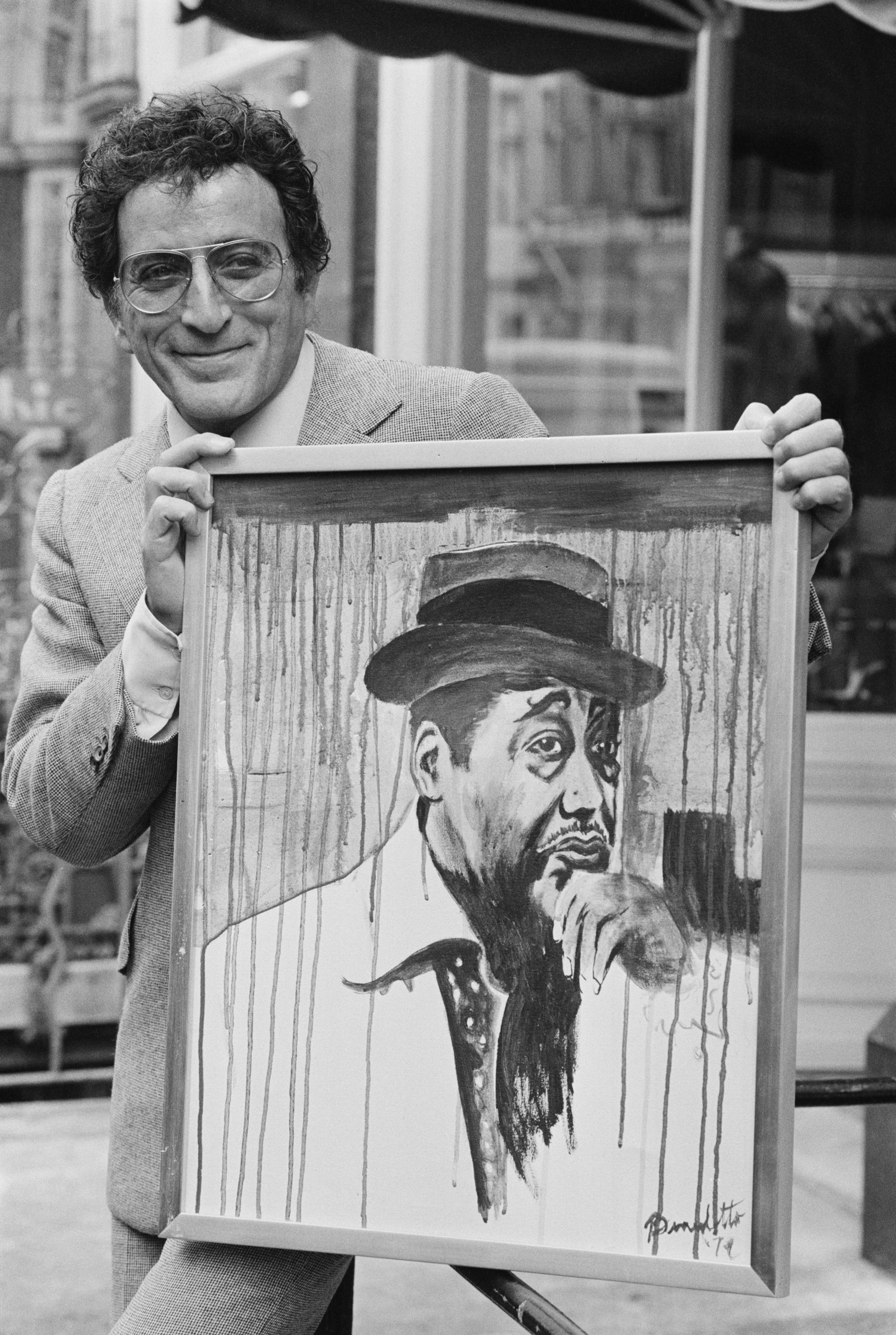
Yet it had its upside: through the GI Bill, Bennett was able to study singing at the American Theatre Wing, learning the bel canto style, strengthening his voice, and leading to his deceptively simple and seductive crooning, simultaneously powerfully robust and deeply sensitive.
Discovered in 1949 by Pearl Bailey, for whom he opened at a Greenwich Village show, he was seen at the event by the comedian Bob Hope; Hope invited him to tour with him, shortening his name to Tony Bennett – until then the singer had performed under his given name of Tony Benedetto.
Through Mitch Miller, he was signed to Columbia Records. Produced by Miller and orchestrally arranged by Percy Faith, his first big hit was “Because of You”. In 1951 it was the number one pop tune in the USA for 10 weeks. He followed it with a cover of Hank Williams’s “Cold, Cold Heart”, and then with “Blue Velvet”.
In 1953 Tony Bennett topped the US charts for eight weeks with “Rags to Riches”, an uptempo big band tune. Later in the year, he had another number one: “Stranger in Paradise” from the musical Kismet, setting in train a pattern of recording show tunes, and creating an overseas audience when the song hit the top spot in the UK.
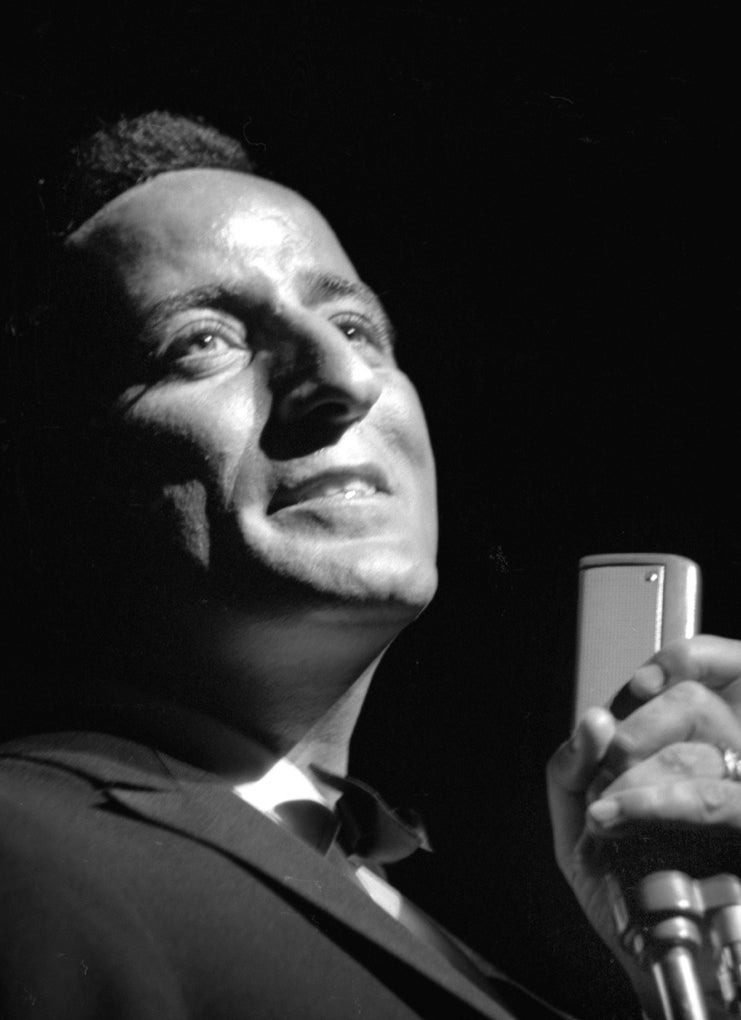
In 1956 he hosted The Tony Bennett Show on NBC TV for a month, a summer replacement for The Perry Como Show; and repeated this three years later. (In October 1962 he sang on the first The Tonight Show Starring Johnny Carson.)
A vocal twist of Bennett lay in the way he sought to vocally replicate the style and phrasing of instrumental musicians. But as demonstrated on albums such as 1958’s Basie Swings, Bennett Sings, his light swinging style showed more than just an affinity for jazz singing: born a couple of decades earlier, Bennett could easily have fronted a big band.
Despite the advent and chart dominance of rock’n’roll in the mid-1950s, he continued to occupy the US hit parade. Recommended by Ralph Sharon, his English musical arranger and pianist, to broaden his appeal by mixing pop songs with jazz material he recorded the percussive-slanted The Beat of My Heart album in 1957, with Herbie Mann and Nat Adderley. Critically acclaimed and a popular hit, the record was followed by 1959’s Basie Swings, Bennett Sings with the Count Basie Orchestra.
Soon Frank Sinatra was championing Bennett, calling him the best popular singer of the 20th century. “For my money, Tony Bennett is the best singer in the business,” Sinatra told Life magazine in 1965. “He excites me when I watch him. He moves me. He’s the singer who gets across what the composer has in mind, and probably a little more.”
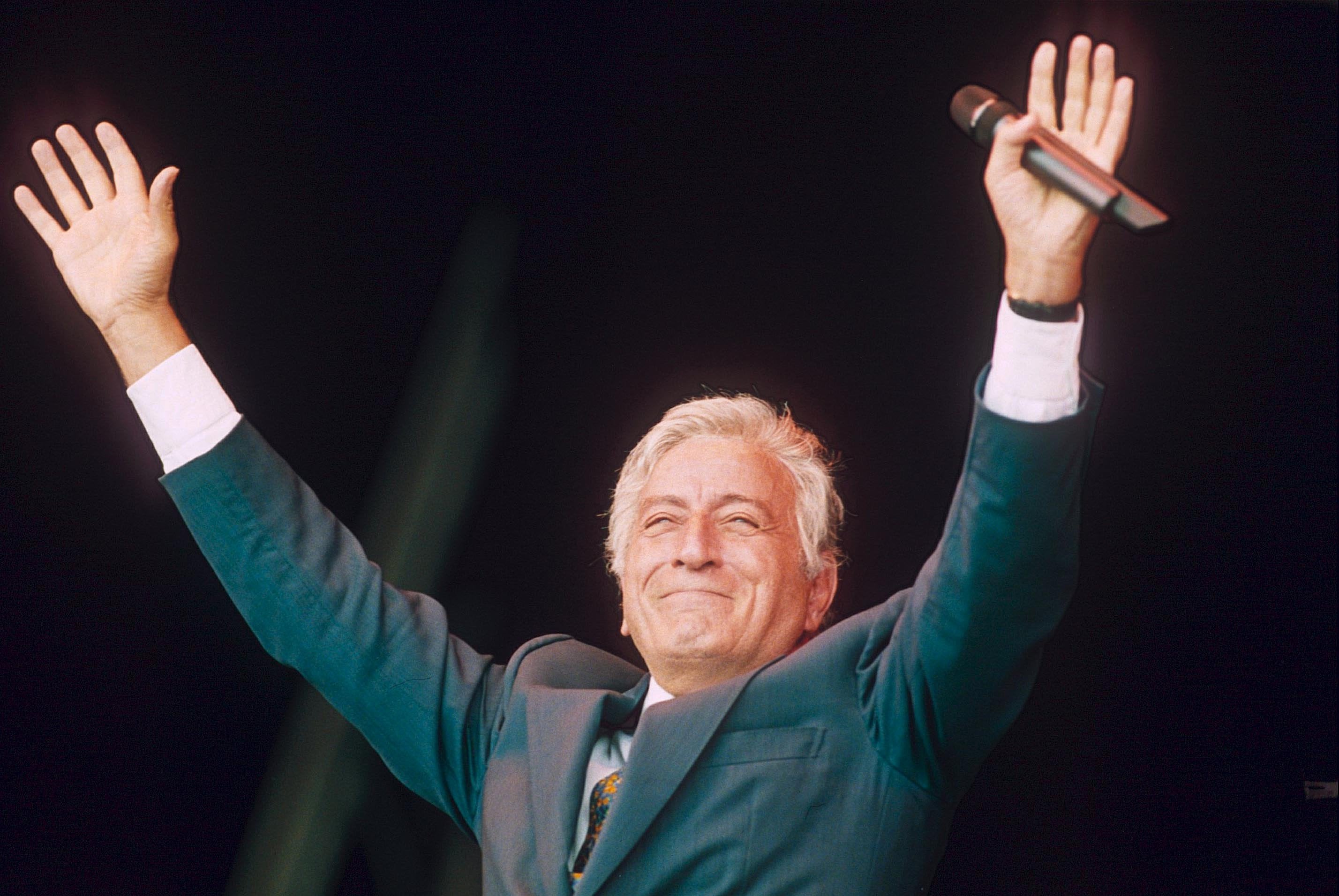
In 1962 he released the song that would become his signature tune, “I Left My Heart in San Francisco”. Although the single never rose higher than number 19 on the US charts, it lingered for over a year on an assortment of hit lists, earning a gold record, and becoming indelibly associated with Bennett. The album of the same name also struck gold and the American top five. I Wanna Be Around, his follow-up album, was similarly successful.
By 1964, however, the winds of change were blowing through popular music; Bennett’s career was badly buffeted by the arrival of The Beatles and the British Invasion. In 1965 he enjoyed his last US Top 40 single with “If I Ruled the World” from the musical Pickwick – the record reached no higher than 34. Pressured by his record company, in 1970 he issued Tony Sings the Great Hits of Today!, which included covers of Lennon and McCartney songs; Bennett was physically ill during the recording of the LP.
Just a year later, the singer divorced his wife, Patricia Beech, whom he married in 1952. Bennett then married Sandra Grant, an actress he had met on the set of The Oscar, a film in which he acted in 1965.
Seeking to relaunch himself, in 1972 he moved to London for a time, hosting Tony Bennett at the Talk of the Town for Thames television.
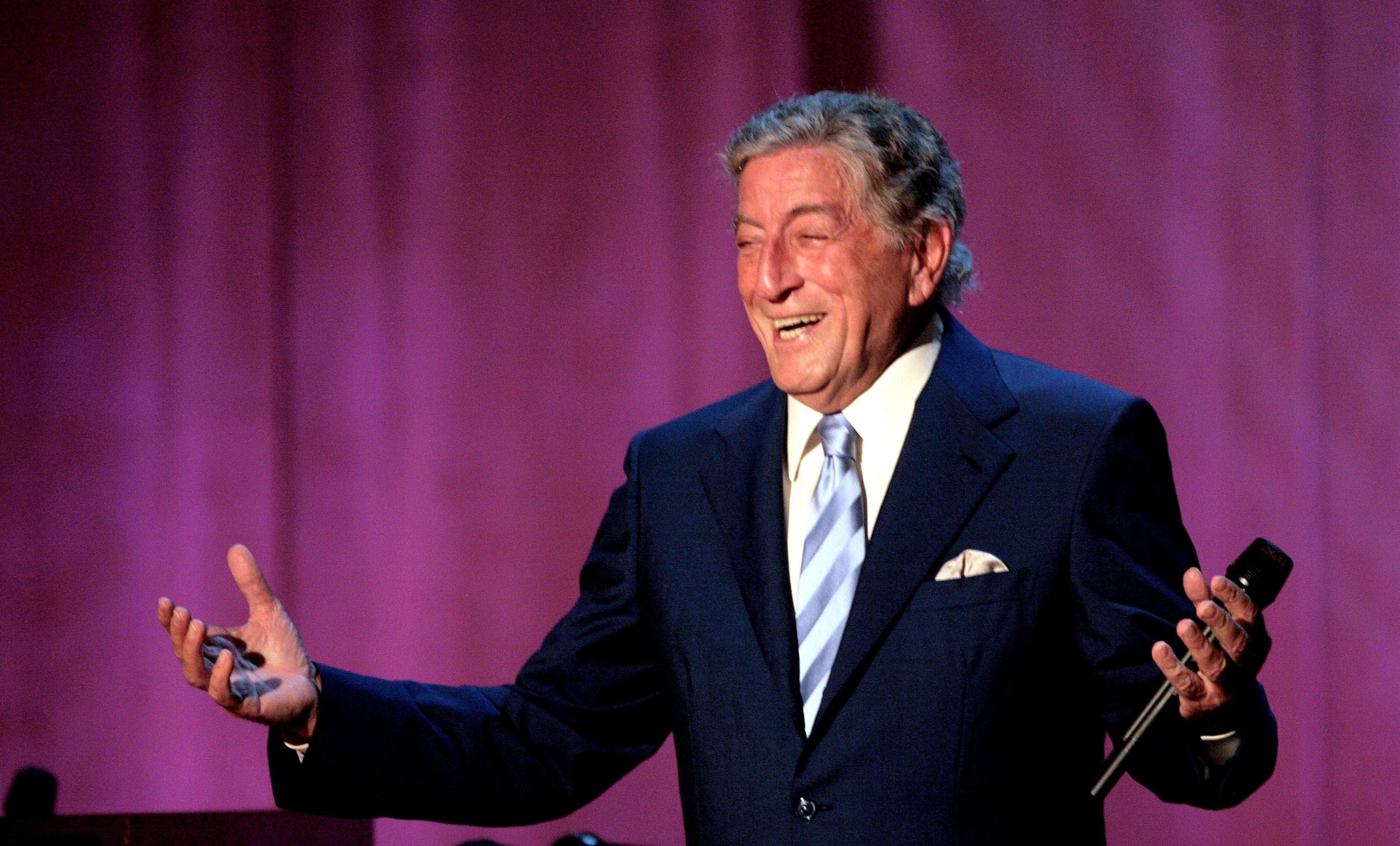
By 1974 he was without a record contract. His attempts at running his own label were stymied by distribution difficulties. The end of the decade found him steeped in cocaine and alcohol addiction, and facing the prospect of the IRS seizing his Los Angeles home for non-payment of taxes. He also separated from Sandra Grant.
In 1979 Bennett came close to death in a cocaine overdose. Humbling himself, he asked Danny and Dae, his adult sons, for assistance. Danny took on his father’s management. He did a deal with the IRS, and re-established his relationship with Ralph Sharon, his former musical director. During the 1980s he organised a series of albums based on classic American songs, as well as a 1994 episode of MTV Unplugged.
Bennett’s fortunes were restored, and by 2015 he was believed to be worth in the region of $100m. His 80th birthday in 2006 was turned into a year of career-boosting publicity. Duets: An American Classic was released for the Christmas market, selling over 200,00 copies in its first week. Paul McCartney, Stevie Wonder, Sting and Elvis Costello were among the artists with whom he recorded, live in the studio with them on each occasion. The record won the 2006 Grammy for Best Traditional Pop Vocal Album.
Tony Bennett even remarried, in 2007, to Susan Crow, a former New York schoolteacher four decades younger than him.
Using his real name, Anthony Benedetto, Bennett also had considerable success as a painter, a talent he exercised every day. His works sell for up to $80,000. In 1996 What My Heart Has Seen was published, an art book featuring many of his paintings. Tony Bennett in the Studio: A Life of Art and Music was a 2007 bestseller.
Tony Bennett, singer and painter, born 3 August 1926, died 21 July 2023
Join our commenting forum
Join thought-provoking conversations, follow other Independent readers and see their replies
Comments
Bookmark popover
Removed from bookmarks